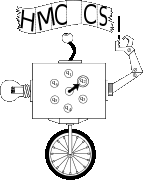On the Complexity of Game, Market, and Network Equilibria
Colloquium
- Speaker(s)
- Shanghua Teng
- Date
- Thursday, February 25, 2010
- Time
- 4:15 PM – 5:15 PM
- Location
- Pryne
I will present some recent advances in Algorithmic Game Theory. I will focus on the computational equivalence of Nash equilibria for games, Arrow-Debreu equilibria and Fisher equilibria for markets, and fractional equilibria for networks. In additional to worst-case complexity, I will consider the smoothed and approximation complexity of these problems. If time permits, I will highlight some potential computational difference between solution concepts in games and in multi-objective optimization.
Joint work with Xi Chen, Xiaotie Deng, Deichen Dai, Ye Du, Li-Sha Huang, Shiva Kintali, Laura Poplawski, Rajmohan Rajaraman, Heiko Röglin, Ravi Sundaram and Paul Valiant.
Shang-Hua Teng is the Seeley G. Mudd Professor and the Chairman of the Computer Science Department at USC Viterbi School of Engineering. He taught as a faculty in the Department of Mathematics of MIT and in the Computer Science Departments of Boston University, the University of Minnesota and UIUC. He has worked and consulted for Microsoft Research, Akamai, IBM Almaden Research Center, Intel Corporation, Xerox PARC, Cray Research/SGI, Thinking Machine Corporation, and NASA Ames Research Center. He received a dual B.S. degree in computer science and in electrical engineering from Shanghai Jiao Tong University in 1985, a M.S. degree in computer science from University of Southern California (USC) in 1988, and a Ph.D. degree in computer science from Carnegie Mellon University (CMU) in 1991.
He is a recipient of the 2009 Fulkerson Prize (AMS-MPS) and the 2008 Gödel Prize (ACM-EATCS) for his joint work on Smoothed Analysis of Algorithms with Daniel Spielman. He is also an ACM Fellow, Alfred P. Sloan Fellow, winner of Senior Xerox Award for Outstanding Faculty Research (UIUC), and has received NSF Faculty Early Career Development Award. His recent research interests include computational game and economics theory, spectral graph theory, scientific computing, and mathematical programming. He has received more than ten US Patents for his work on compiler optimization and Internet technology.
